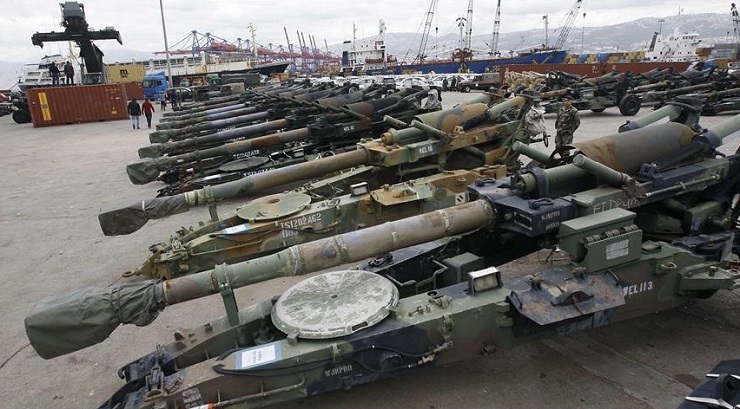On July 2, Al Jazeera reported that the Saudi-led coalition began a new major military operation in Yemen against Ansar Allah (i.e. “Supporters of God”, also known as the Houthis, “an Islamic political and armed” opposition movement). Air raids were reportedly conducted against “the capital, Sanaa, as well as Marib, al-Jouf, al-Bayda, Hajjah and Saada provinces”. According to the Houthi-run Al Masirah Media Network, the air strikes launched by the coalition’s air force “struck” Sanaa’s international airport. Deaths and injuries were also reported.
Pars Today, an Iranian radio station, said that Saudi fighter jets had bombed a warehouse with medical supplies (on hospital 48 premises) in the Sab’ain District of the capital Sanaa. According to the news source, Yemen’s Ministry of Human Rights stated that war planes of the Kingdom-led coalition had deployed powerful cluster bombs during air raids in Sanaa and the Saada Governorate in north-western Yemen.
The Houthis have accused Saudi Arabia of using excessive violence and said that British and American military pilots were part of the air raids on Yemen.
The Saudi-led coalition has been carrying out air strikes against the Houthis’ positions since April 2015. Mostly civilians have died in Yemen as a result of this bombing campaign. Incomplete estimates indicate that approximately 100,000 people have died and 3 million more have been displaced in Yemen since the start of the civil war. The United Nations World Food Program (WFP) has reported that “over 20 million Yemenis are food insecure”, and 326,666 children aged 6 to 23 months required nutrition assistance.
According to the Fars News Agency, on April 12, 2015, “anti-war demonstrators gathered outside the Saudi Embassy in London to protest against” the Saudi-led air strikes on Yemen “calling for an end to the aggression against the impoverished country”. The protesters, carrying “Hands off Yemen” and “No to war in Yemen” placards, urged Saudi Arabia and its allies to stop the aggression against the people of Yemen.
In July 2020, there were more demonstrations condemning “the atrocities of the Yemen war” and “Britain’s role of facilitating” the conflict after Daily Maverick (a South African daily online newspaper) reported in its declassified section that “the Royal Air Force (RAF) and Britain’s largest arms company, BAE Systems”, were continuing to support Saudi Arabia’s assault on Yemen, according to statements made by Britain’s Defense Minister.
Campaign Against Arms Trade (CAAT) spokesman Andrew Smith stated that findings exposed “the extent of the collusion between London and Riyadh”. “The war in Yemen has created the worst humanitarian crisis in the world,” he pointed out. “The UK government has been utterly complicit in fueling the crisis. UK-made fighter jets have been crucial to the bombardment, and it would seem many of the personnel flying them were trained by UK forces,” Andrew Smith added. The spokesman also said
“This training is symptomatic of the cozy and immoral political and military relationship between the UK government and the Saudi regime. We are always told that the UK promotes human rights around the world, but it is arming, supporting and collaborating with one of the most authoritarian dictatorships in the world.”
Daily Maverick also reported that in 2019, “CAAT successfully obtained a Court of Appeal ruling preventing UK ministers from granting new export licenses for weapons that might be used” by Saudi Arabia and its coalition partners in the conflict in Yemen. Still, according to the Declassified UK article, military training courses “continued to be offered to coalition members”. In September 2019, Secretary of State for International Trade and President of the Board of Trade Liz Truss “had to apologize to parliament” for allowing the export of fuel gauges and radio spares, “which was in breach of the court ruling”.
On July 7, 2020, it was reported that the UK would “resume granting licenses for the export of military equipment to Saudi Arabia”. In a written statement, Liz Truss said that there was “not a clear risk that the export of arms and military equipment to Saudi Arabia might be used in the commission of a serious violation of” international humanitarian law (IHL). According to the Secretary of State for International Trade, incidents which were “assessed to be possible violations of IHL occurred at different times, in different circumstances and for different reasons”, thus the conclusion was that those were “isolated incidents”. The UK government also announced that they would “begin the process of clearing the backlog of license applications for Saudi Arabia and its coalition partners” that had built up since the June 2019 Court of Appeal ruling.
According to CAAT, the UK has sold some £5.3 billion ($6.7 billion) worth of arms to Riyadh since the Saudi campaign in Yemen began in Mach 2015. Reportedly, the licenses included “£2.5 billion in the ML4 category, covering bombs, missiles, grenades, and countermeasures, and related equipment and components”.
It is worth noting that the announcement about resuming the granting of licenses for the export of arms to Saudi Arabia was made the day after UK’s Foreign Secretary had introduced “the new Global Human Rights Sanctions regime and the first sanctions on those involved in human rights abuses”.
Human rights groups, such as CAAT condemned the “government decision to allow” new weapon sales to Saudi Arabia.
Vladimir Danilov, political observer, exclusively for the online magazine “New Eastern Outlook”.

